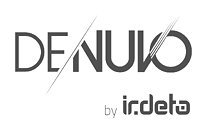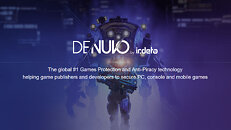T0@st
News Editor
- Joined
- Mar 7, 2023
- Messages
- 3,328 (3.92/day)
- Location
- South East, UK
| System Name | The TPU Typewriter |
|---|---|
| Processor | AMD Ryzen 5 5600 (non-X) |
| Motherboard | GIGABYTE B550M DS3H Micro ATX |
| Cooling | DeepCool AS500 |
| Memory | Kingston Fury Renegade RGB 32 GB (2 x 16 GB) DDR4-3600 CL16 |
| Video Card(s) | PowerColor Radeon RX 7800 XT 16 GB Hellhound OC |
| Storage | Samsung 980 Pro 1 TB M.2-2280 PCIe 4.0 X4 NVME SSD |
| Display(s) | Lenovo Legion Y27q-20 27" QHD IPS monitor |
| Case | GameMax Spark M-ATX (re-badged Jonsbo D30) |
| Audio Device(s) | FiiO K7 Desktop DAC/Amp + Philips Fidelio X3 headphones, or ARTTI T10 Planar IEMs |
| Power Supply | ADATA XPG CORE Reactor 650 W 80+ Gold ATX |
| Mouse | Roccat Kone Pro Air |
| Keyboard | Cooler Master MasterKeys Pro L |
| Software | Windows 10 64-bit Home Edition |
Irdeto is the current owner of Denuvo Software Solutions—the Austrian development team behind the infamous anti-tamper technology and digital rights management (DRM) system. According to Ars Technica neither of these organizations have made great efforts (in the past) to engage in discussion about the controversial anti-piracy and anti-cheat suites—but Steeve Huin, Irdeto's Chief Operating Officer of Video Games—agreed to grant the publication an exclusive interview. The article is titled "Denuvo wants to convince you its DRM isn't evil," which sums up a lot of the public perception regarding Denuvo technologies—having received plenty of flak for high CPU usage and causing excessive activity within storage components. Some users propose that the latter scenario has resulted in shorter lifespans for their solid-state drives. Ars Technica has a long history of Denuvo-related coverage, so a company representative has been sent in for some damage control.
Off the bat, Huin acknowledges that he and his colleagues are aware of Denuvo's reputation: "In the pirating/cracking community, we're seen as evil because we're helping DRM exist and we're ensuring people make money out of games." He considers the technology to be a positive force: "Anti-piracy technologies is to the benefit of the game publishers, [but also] is of benefit to the players in that it protects the [publisher's] investment and it means the publishers can then invest in the next game...But people typically don't think enough of that...Whether people want to believe it or not, we are all gamers, we love gaming, we love being part of it. We develop technologies with the intent to make the industry better and stronger."


Huin informs Ars Technica that his company (Irdeto) is working on a testing program—two nearly identical versions of a game will be presented to "trusted" media outlets. One variant with Denuvo protection and one without—they hope to have this comparison program released within the next couple of months. Huin & Co. are hopeful that future press coverage will include independently produced benchmarks: "(so you can) see for yourself that the performance is comparable, identical... and that would provide something that would hopefully be trusted by the community."
View at TechPowerUp Main Site | Source
Off the bat, Huin acknowledges that he and his colleagues are aware of Denuvo's reputation: "In the pirating/cracking community, we're seen as evil because we're helping DRM exist and we're ensuring people make money out of games." He considers the technology to be a positive force: "Anti-piracy technologies is to the benefit of the game publishers, [but also] is of benefit to the players in that it protects the [publisher's] investment and it means the publishers can then invest in the next game...But people typically don't think enough of that...Whether people want to believe it or not, we are all gamers, we love gaming, we love being part of it. We develop technologies with the intent to make the industry better and stronger."


Huin informs Ars Technica that his company (Irdeto) is working on a testing program—two nearly identical versions of a game will be presented to "trusted" media outlets. One variant with Denuvo protection and one without—they hope to have this comparison program released within the next couple of months. Huin & Co. are hopeful that future press coverage will include independently produced benchmarks: "(so you can) see for yourself that the performance is comparable, identical... and that would provide something that would hopefully be trusted by the community."
View at TechPowerUp Main Site | Source








